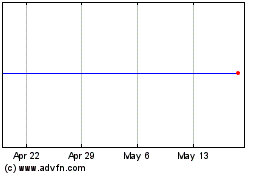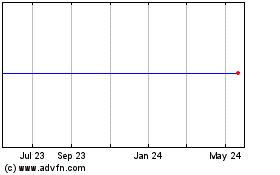By Sam Goldfarb and Liz Hoffman
Goldman Sachs Group Inc. is struggling to sell $2 billion in
bonds backing the buyout of software firm Solera Holdings Inc.,
another sign of cracks in the market for the low-rated debt that
has been a key driver of the takeover boom.
Solera's sale to Vista Equity Partners was one of the biggest
leveraged buyouts of last year, at $6.5 billion including debt, and
has been widely viewed as a test of the credit market.
The bond sale comes at a time when U.S. junk-bond issuance has
dropped more than 70% from a year ago and borrowing costs have
increased, as risk-averse investors back away from riskier
securities or demand sweeter terms.
The pullback threatens a mergers-and-acquisitions boom that has
been driven partly by cheap and available credit. It also comes as
a wave of debt from the last buyout boom is coming due, raising the
specter of defaults or, at the very least, the prospect that
borrowers could be forced to refinance on less-hospitable
terms.
Solera's bonds carry a Caa1 rating from Moody's Investors
Service, which is where some of the worst market carnage has taken
place in recent months as investors dial back their risk taking.
U.S. junk bonds last year posted their first annual decline since
2008, reflecting a broad retrenchment in the lowest reaches of the
market.
Demand for the lowest-rated debt "is really nonexistent now,"
said Matthew Duch, a portfolio manager at Calvert Investments.
Defaults are expected to rise in 2016 after spending much of the
postcrisis period below historical averages, according to Moody's.
U.S. companies have $1.3 trillion in junk debt maturing between now
and 2020, according to S&P Ratings Services. An important test
case is Toys "R" Us, which has $1.6 billion in debt coming due
through 2020, much of it left over from its 2005 buyout.
Goldman originally expected to sell the Solera bonds at an
annual yield of about 10%, investors said. But by midday Thursday,
it had found buyers for only about half the bonds, and pricing
expectations had moved above 11%. The sale, which had been expected
to close Thursday, may be pushed to Friday or into next week,
investors said.
The bond sale has proved a tougher task than Solera's $1.9
billion offering of leveraged loans backing the deal. One option is
for Solera to sell fewer bonds and increase the size of its loan,
people familiar with the matter said.
Painful for buyers, the pullback promises to be equally
uncomfortable for banks, which earn big fees from lending
commitments. In good times, the deals are safe because the debt is
easily sold to other investors. But in a crunch, banks can be
forced to keep it on their balance sheets and hold capital reserves
against it, which hurts profitability.
Goldman, in particular, has sought to become a bigger player in
lending to back deals, a corner of Wall Street historically
dominated by commercial banks such as Bank of America Corp. and
J.P. Morgan Chase & Co.
Should such loans become tougher to unload or replace with
bonds, banks may become choosier about deals to back.
LeasePlan International NV last week shelved a EUR1.55 billion
($1.71 billion) bond sale after failing to attract enough investor
interest. Banks were forced to fund Endurance International Group
Holdings Inc.'s acquisition of email-marketing firm Constant
Contact Inc. after failing to find buyers for $1.1 billion of
buyout debt.
There are signs that investor wariness is extending to
higher-rated borrowers. Insurer CNA Financial Corp., whose debt is
rated investment grade, last week trimmed the size of a bond
offering and raised the interest rate after investors balked at the
initial terms.
Federal Reserve Chairwoman Janet Yellen, in congressional
testimony this month, listed higher borrowing costs for riskier
firms among factors that could weigh on economic growth in coming
months.
Solera negotiated its sale in September, just as problems were
starting to emerge in the market for risky debt. The company
fast-tracked its auction process to stay ahead of volatility in the
financing market, and at least one interested party declined to bid
because it was concerned it couldn't raise the needed debt,
according to a regulatory filing and a person familiar with the
matter.
The deal risked running afoul of regulators, who frown on
transactions carrying debt higher than six times earnings before
interest, taxes, depreciation and amortization, a measure of cash
flow. Solera was predicting about $493 million in 2016 adjusted
Ebitda.
To ease concerns, affiliates of Goldman Sachs and Koch
Industries Inc. agreed to buy up to $800 million in preferred
shares to fund the deal. Such investments, while they pay a fixed
debt-like return, are treated as equity and would help keep
Solera's debt ratio in check.
Apollo Management Group LLC's pending $6.9 billion buyout of ADT
Corp., announced earlier this month, also hinges on an investment
from Koch. Issuing preferred shares is expensive, and is often a
sign that more traditional debt sources are tapped out.
The biggest leveraged acquisition of last year, Carlyle Group
LP's carve-out of Symentec Corp.'s data-storage business, also has
hit a debt snag this year. Carlyle lowered its purchase price last
month amid financing pressures, people familiar with the matter
said.
Write to Liz Hoffman at liz.hoffman@wsj.com
(END) Dow Jones Newswires
February 25, 2016 19:17 ET (00:17 GMT)
Copyright (c) 2016 Dow Jones & Company, Inc.
Strategic Hotel Capital (NYSE:SLH)
Historical Stock Chart
From Jan 2025 to Feb 2025

Strategic Hotel Capital (NYSE:SLH)
Historical Stock Chart
From Feb 2024 to Feb 2025
